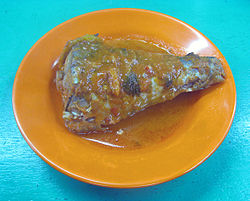Asam Pedas

Asam padeh, a Padang style asam pedas
|
|
| Alternative names | Asam padeh (Minangkabau) |
|---|---|
| Course | Main course |
| Place of origin | Indonesia and Malaysia |
| Region or state | Sumatra and Malay Peninsula |
| Creator | Minangkabau and Malay |
| Serving temperature | Hot or room temperature |
| Main ingredients | Fish cooked in sour and hot sauce |
| |
|
Asam Pedas (Indonesian: Asam Pedas, Malay: Asam Pedas, Minangkabau: Asam Padeh, English: Sour and Spicy) is a Minangkabau and Malay sour and spicy fish stew dish. It is popular in Indonesia and Malaysia.
The spicy and sour fish dish is known widely in Sumatra and Malay Peninsula. It is part of the culinary heritage of both Minangkabau and Malay traditions, thus its exact origin is unclear. The Minang asam padeh can be easily found throughout Padang restaurants in Indonesia and Malaysia.
It has become a typical cuisine of Malays from Jambi, Riau, Malay Peninsula, and as far north in Aceh. The spice mixture and the fish used might be slightly different according to the area.
The main ingredients in asam pedas are usually seafood or freshwater fish. They are cooked in asam (tamarind) fruit juice with chilli and spices.
The cooking process involves soaking the pulp of the tamarind fruit until it is soft and then squeezing out the juice for cooking the fish. Asam paste may be substituted for convenience. Vegetables such as terong or brinjals (Indian eggplants), okra and tomatoes are added. Fish and seafood — such as mackerel, mackerel tuna, tuna, skipjack tuna, red snapper, gourami, pangasius or cuttlefish — either the whole body or sometimes only the fish heads are added to make a spicy and tart fish stew. It is important that the fish remain intact for serving so generally the fish is added last.
...
Wikipedia
